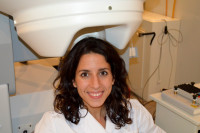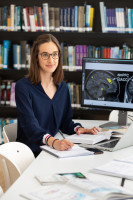Mental Health & Neurology
Prevention & Personalised Health
Alzheimer's Disease, Dementia & Neurodegenerative Diseases
Brain Mechanisms & Psychology
Diagnosis & Imaging
Biomarkers
Post-Doctoral Fellowships
Spain
2017.01.31
Alzheimer's Disease: finding early indications of the disease for better therapeutic interventions
Detecting precocious abnormal neural activity in patients likely to develop AD
To test her hypothesis, Dr. Julia Guiomar Niso Galán will compare recordings of brain activity collected over the past 4 years on more than 500 participants. To study brain activity throughout the different stages of AD and probable AD, 4 categories of patients were chosen : declared AD patients, patients with mild cognitive impairment, subjects complaining about memory problems, and asymptomatic subjects. Using a neuroimaging technique, Dr. Julia Guiomar Niso Galán and her team will try to detect early manifestations of abnormal neural activity in the participants likely to develop the disease. "Owing to the type and number of participants screened, as well as the duration of the study, we know that part of the data we collected comes from patients who will develop AD in the future", explains Dr. Julia Guiomar Niso Galán. "By studying their brain activity before the clinical onset of the disease, we aim to identify reliable indicators for early diagnosis, and even prevention for people at risk"."Our ultimate goal is to measure a healthy person's risk of developing the disease", she adds.
Current estimations indicate that around 50 million people worldwide live with dementia, and the number is expected to double in the next 20 years. The epidemic represents a major public health concern, not to mention a devastating ordeal for patients and their families. By aiming to detect early pre-clinical manifestations of Alzheimer's disease, Dr. Julia Guiomar Niso Galán objective is to contribute to providing the means for better therapeutic interventions and prevention.

Julia Guiomar
NISO GALAN
Institution
Center for Biomedical Technology
Country
Spain
Nationality
Spanish


